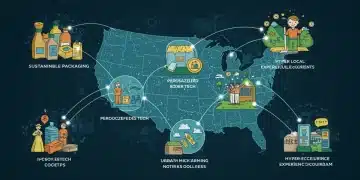Education programs expanding access to online college degrees

Education programs expanding access to online college degrees enhance flexibility, leverage technology for personalized learning, and focus on practical skills to better prepare students for the job market.
Education programs expanding access to online college degrees are changing the landscape for learners. Have you ever considered how these programs might fit into your life? Let’s dive into the impact they can have on diverse students.
Understanding online college degree programs
Online college degree programs have become a vital part of modern education. Understanding how these programs work is essential for anyone considering higher education.
These programs allow students to earn degrees without needing to attend traditional classes. This flexibility is one of the main reasons for their popularity. Moreover, they provide opportunities for individuals who may not have access to conventional educational settings.
Key Features of Online College Degree Programs
Many online degree programs offer valuable features that enhance the learning experience.
- Access to a wide range of courses and majors.
- Flexible schedules for studying and coursework completion.
- Interactive learning environments with virtual classrooms.
- Support services for academic and personal needs.
With technology evolving, online college degrees are more innovative than ever. Students can now participate in discussions, collaborate on projects, and connect with instructors from anywhere in the world.
Advantages of Online Learning
Choosing an online program comes with numerous benefits.
- Cost effectiveness compared to traditional colleges.
- Ability to study at one’s own pace.
- Reduced commuting time and expenses.
Additionally, online programs often equip students with important skills. For instance, time management and self-discipline are necessary for success. These skills are essential in today’s job market.
Overall, understanding how online college degree programs function can greatly impact your educational path. They offer unique opportunities that might not be available through traditional routes.
Benefits of expanding access to online education
Expanding access to online education brings numerous benefits for students, communities, and educational institutions. It allows more people to pursue their educational goals and can transform lives.
One major advantage is the increased flexibility that online education provides. Students can study at their own pace, fitting classes around work and personal commitments. This flexibility often leads to a better balance between studies and life responsibilities.
Accessibility for Diverse Learners
Online education creates opportunities for individuals who may face barriers in traditional settings. This includes those with disabilities, single parents, and full-time workers.
- Reduced travel costs and time.
- Ability to study from remote locations.
- Access to a variety of resources and materials.
Furthermore, online courses can often be tailored to meet diverse learning needs. With interactive tools and multimedia resources, students can engage with content in varied ways, enhancing understanding and retention.
Cost-Effectiveness
Another significant benefit is the cost savings associated with online education. Typically, online programs have lower tuition rates compared to traditional colleges. Additionally, students can save money on commuting and housing.
- Affordable textbooks and materials available online.
- Many programs offer financial aid options.
- Opportunities to work while studying.
Moreover, with the rise of free online courses and MOOCs (Massive Open Online Courses), more learners can access high-quality education. This pricing model allows more students to gain skills needed for the workforce.
The benefits of expanding access to online education not only help individuals but also contribute positively to society. A more educated workforce can drive innovation, economic growth, and social improvement.
Challenges in online education accessibility

While online education offers many advantages, it also faces significant challenges in accessibility. Understanding these obstacles is crucial for improving the learning experience for everyone.
One primary challenge is the issue of internet access. Not all students have reliable internet connections, especially in rural or low-income areas. This situation can hinder their ability to participate fully in online classes.
Technological Barriers
Another barrier comes from the technology itself. Some students may not have access to the necessary devices, such as laptops or tablets, to engage in online learning.
- Lack of adequate hardware can limit participation.
- Software requirements may not be met by all devices.
- Compatibility issues can arise with different platforms.
Additionally, digital literacy is a growing concern. Students may struggle to navigate online platforms and utilize the tools provided in their courses. This challenge can create gaps in learning opportunities and affect overall success.
Support Services and Resources
Support services, such as tutoring and counseling, are essential for student success. In many cases, these services are not as readily available for online students.
- Difficulty in accessing mental health resources.
- Limited academic advising tailored for online learners.
- Challenges in finding peer support networks.
Moreover, students often miss out on the social interactions that occur in a traditional classroom setting. This lack of engagement can impact motivation and lead to feelings of isolation.
Addressing these challenges requires commitment from educational institutions. By focusing on providing equal access and support, online education can become more inclusive for all learners.
Innovative programs improving education reach
Innovative programs are reshaping the landscape of online education. They aim to improve access and enhance learning experiences for students everywhere. These initiatives play a critical role in making education more available to a diverse range of learners.
One groundbreaking approach is the implementation of adaptive learning technologies. These technologies personalize the learning experience for each student, tailoring content to fit individual needs. This customization helps students master subjects at their own pace, leading to better outcomes.
Collaborative Online Platforms
Another important innovation is the rise of collaborative online platforms. These platforms encourage interaction among students and educators.
- Creating virtual study groups.
- Facilitating real-time discussions and feedback.
- Providing access to a global network of peers.
Through these interactions, students can gain different perspectives and enhance their understanding of material.
Microcredentials and Skill-Based Learning
Microcredentials are also transforming online education. These short, focused courses allow learners to gain specific skills quickly. They are especially beneficial for those seeking to enter the workforce or upskill in their current jobs.
- Offering targeted pathways to employment.
- Helping employers identify qualified candidates.
- Encouraging lifelong learning.
Furthermore, these programs often partner with businesses to ensure that the skills being taught align with industry demands. This alignment increases job readiness for graduates, allowing them to transition smoothly into careers.
As technology continues to evolve, innovative programs will likely play an even larger role in expanding access to education and improving learning efficiency. They offer solutions that can help bridge gaps and meet the needs of a diverse student population.
Future trends in online college degrees
Future trends in online college degrees are evolving rapidly. As technology advances, the way we learn and earn degrees is changing significantly. Online education is becoming more mainstream, and understanding these trends can help students prepare for what lies ahead.
One notable trend is the increased use of artificial intelligence in course delivery. AI can provide personalized learning experiences, adapting content based on a student’s performance and preferences. This technology not only enhances engagement but also improves learning outcomes by catering to individual needs.
Hybrid Learning Models
Another trend is the shift toward hybrid learning models. These combine online and in-person experiences, giving students the best of both worlds. Students can benefit from the flexibility of online classes while still having the opportunity for face-to-face interactions.
- Flexibility to attend classes remotely.
- Access to hands-on workshops and labs.
- Opportunities for networking and collaboration.
Such models allow institutions to cater to different learning styles and needs. They also help maintain a sense of community among students.
Focus on Lifelong Learning
There is a growing emphasis on lifelong learning and upskilling. With rapidly changing job markets, many professionals seek to continuously expand their knowledge and skills. Online degree programs are adapting to this demand by offering courses that focus on practical skills relevant to various industries.
- Short courses and certifications.
- Flexible schedules to accommodate working adults.
- Training in emerging fields.
As employers increasingly value skills over traditional degrees, online programs will likely expand their offerings to stay competitive. This shift opens up new opportunities for both students and educational institutions.
Overall, the future of online college degrees looks promising. Innovations in technology and educational practices are set to make learning more accessible and effective for everyone.
In conclusion, the future of online college degrees is bright with numerous opportunities for students. As technology continues to evolve, educational institutions are adapting to meet the needs of diverse learners. Innovative programs incorporating artificial intelligence and hybrid learning models enhance accessibility and engagement. Moreover, the emphasis on lifelong learning prepares students for the ever-changing job market. With these trends, online education is set to provide more flexible, relevant, and effective pathways to success for everyone.
FAQ – Frequently Asked Questions about Online College Degrees
What are the benefits of online college degrees?
Online college degrees offer flexibility, accessibility, and the ability to study at your own pace, making education more attainable for diverse learners.
How does technology enhance online learning?
Technology like AI provides personalized learning experiences, while collaborative platforms foster engagement and interaction among students.
What trends are shaping the future of online education?
Key trends include hybrid learning models, an emphasis on lifelong learning, and the use of adaptive learning technologies.
Can online education prepare students for the job market?
Yes, many online programs focus on practical skills and upskilling, making graduates more competitive in the workforce.





